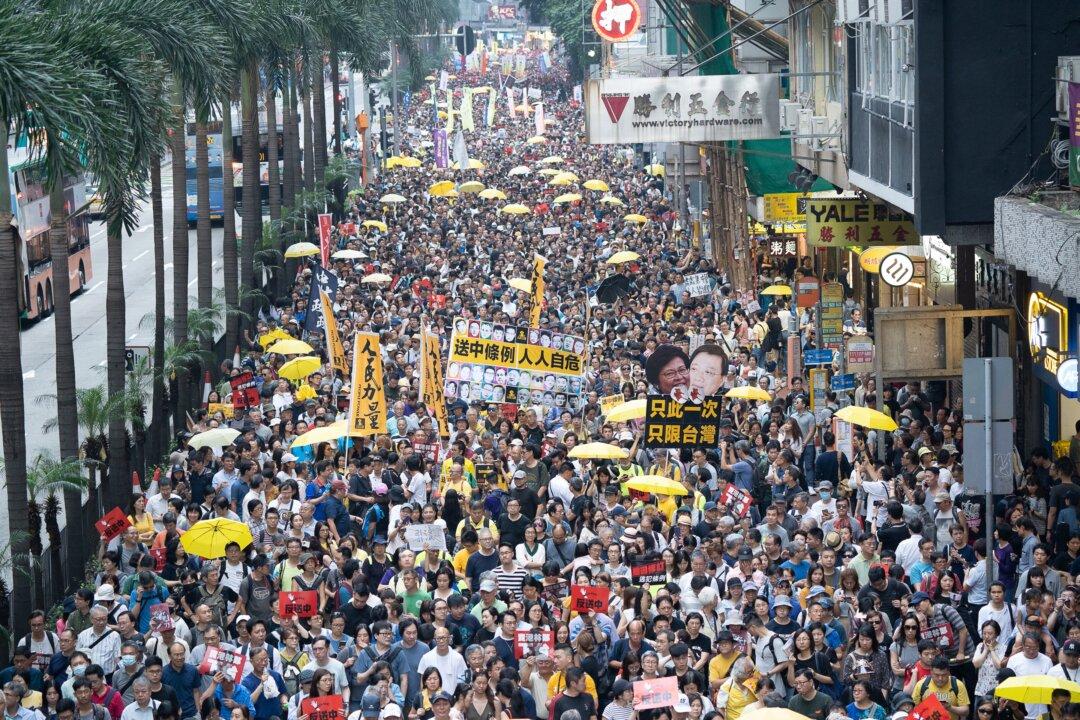More than 130,000 people flooded the streets of Hong Kong on April 28 to oppose proposed amendments to the city’s extradition laws that would allow criminal suspects to be sent to mainland China—far greater than the expected turnout of 12,000.
Police gave a much more conservative estimate, saying that at the parade’s peak, 22,800 people attended. But The Epoch Times’ Hong Kong reporters saw the crowd continually growing as the parade made its way through the city.
Currently, Hong Kong has signed individual extradition agreements with 20 countries, including the United States, Canada, the UK, Australia, and New Zealand.
The newly proposed extradition laws, first announced in February, would allow criminal suspects from any region—including mainland China—to be extradited without Hong Kong’s unicameral legislature, the Legislative Council, signing off on the requests. The city’s head of government, the chief executive, would be able to approve the extradition requests directly.
The statement continued by saying the administration would closely monitor the situation in Hong Kong. “Societies are best served when diverse political views are respected and can be freely expressed. Continued erosion of the ‘One country, Two systems’ framework puts at risk Hong Kong’s long-established special status in international affairs.”
The Parade
The parade began in the late afternoon, snaking its way from Causeway Bay to the Central Government Complex, the headquarters of the Hong Kong government at Admiralty.Council members, democracy group activists, celebrities, and ordinary citizens participated.
At the front of the parade was a large square banner that read, “Oppose the extradition of suspects to mainland China, oppose the evil law, reverse the amendments on Fugitive Offenders Ordinance.”
“Once the Fugitive Offenders Ordinance is passed, each of us may be extradited to mainland China for trial. ... We won’t have the basic right to a fair trial at that time,” he said.
Many held signs that called for the resignation of the current chief executive, Carrie Lam Cheng Yuet-ngor.
People also held yellow umbrellas, a symbol that came to represent the Umbrella Movement of 2014, when scores of Hongkongers occupied the streets of the city’s main financial district to call for universal suffrage in how the city votes for the chief executive. The protest lasted 79 days.
Protesters’ Concerns
Ching Cheong, a senior Hong Kong journalist, told the Chinese-language Epoch Times he’s concerned about the implications for media critical of the Chinese regime, as well as the entire city’s populace. “I want to emphasize that this law is not only targeted at the news industry, but everybody in Hong Kong,” he said.Cheong noted that with the Chinese regime’s influence already threatening freedom of speech in Hong Kong, he worries that the extradition law will have an even more chilling effect on media in Hong Kong.
Singer Anthony Wong Yiu Ming said, “Many innocent people will be given a guilty sentence.” He is worried that “Hong Kong will have many political prisoners” if the extradition amendments allow the Chinese regime to ensnare its critics.
Denise Ho Wan-see, also a singer and outspoken supporter of Hong Kong’s pro-democracy efforts, urged Hongkongers to use their “freedoms to fight for our fundamental wish [autonomy].”





